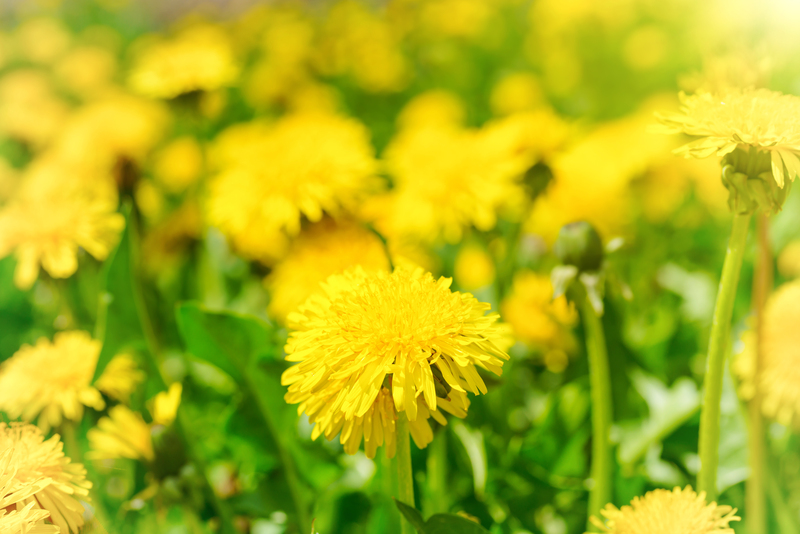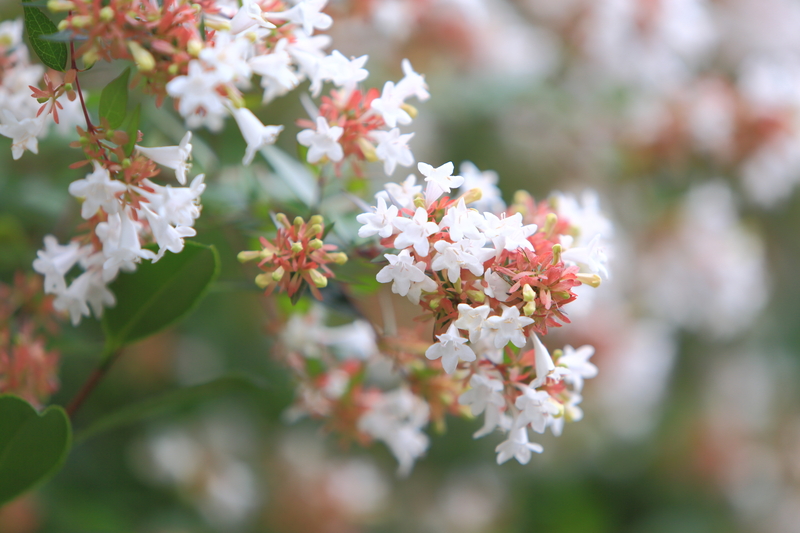Turning Garbage into Gardens with Nutrient-Rich Soil
Posted on 06/09/2025
Turning Garbage into Gardens with Nutrient-Rich Soil: A Green Revolution Begins
Imagine transforming your household waste into a lush, fertile garden teeming with healthy plants and vibrant vegetables. In today's environmentally conscious world, learning how to turn organic garbage into nutrient-rich soil offers a sustainable solution for reducing waste and improving soil fertility. In this comprehensive guide, we'll uncover the secrets of composting and recycling food scraps, unveiling proven strategies for turning garbage into gardens and nourishing your outdoor spaces with black gold.

Why Should We Turn Waste Into Soil?
Around the globe, millions of tons of organic waste are sent to landfills each year, where they generate greenhouse gases and contribute to environmental problems. By transforming organic garbage into garden soil, we:
- Reduce landfill waste and carbon footprint
- Enhance garden productivity with natural fertilizers
- Promote a circular economy and zero-waste lifestyles
- Save money on chemical fertilizers and soil amendments
Turning kitchen scraps and yard trimmings into nutrient-rich compost provides environmental and economic benefits that extend beyond your backyard.
Understanding Nutrient-Rich Soil: What Makes It Special?
Nutrient-rich soil is the lifeblood of successful gardening. Healthy soil teems with organic matter, beneficial microorganisms, and essential nutrients that fuel plant growth. When we convert garbage into gardens, we harness the power of decomposition to enrich our earth without artificial chemicals.
Key Benefits of Nutrient-Dense Soil:
- Enhanced structure: Improves water retention and aeration, allowing roots to breathe.
- Microbe activity: Supports beneficial bacteria and fungi, increasing nutrient availability.
- Balanced nutrition: Supplies steady amounts of nitrogen, phosphorus, potassium, and trace minerals.
- Improved resilience: Helps plants withstand drought, pests, and disease.
*Gardens started with rich, organic compost consistently outperform those using synthetic or poor-quality soils.*
How Garbage Becomes Garden Gold: The Science of Composting
Composting is the controlled decomposition of organic matter, turning kitchen and yard waste into a valuable soil amendment. At the heart of this process are billions of microorganisms--from bacteria to fungi and earthworms--that break down materials, converting garbage into nutrient-packed humus suitable for gardens.
What Materials Can You Compost?
- Acceptable "green" waste: Fruit and vegetable scraps, coffee grounds, tea bags, fresh grass clippings
- Acceptable "brown" waste: Dry leaves, shredded paper, cardboard, straw, wood chips
- What to avoid: Meat, dairy, fats, treated wood, diseased plants, and anything synthetic
By blending nitrogen-rich "greens" with carbon-rich "browns," you create the perfect environment for decomposition.
Step-by-Step: Turning Garbage Into Gardens
1. Choose Your Composting Method
There are several effective composting methods, depending on your space and needs:
- Traditional Compost Bin or Pile: Ideal for backyards; build a heap of mixed greens and browns and let nature take its course.
- Vermicomposting (using worms): Great for small spaces and indoor use; red worms efficiently break down food scraps into high-value worm castings.
- Bokashi Composting: Uses beneficial microbes to ferment all types of kitchen waste, including some items not suitable for traditional composters.
- Tumbler Bins: Enclosed and easy to turn, speeding up decomposition and keeping pests at bay.
2. Start Building Your Pile
- Begin with a layer of browns (shredded leaves, cardboard), followed by a layer of greens (kitchen scraps).
- Aim for a ratio of about 2 parts brown to 1 part green for optimal breakdown.
- Sprinkle water to keep the heap moist but not soggy.
3. Maintain Your Compost
- Turn or aerate the pile every 1-2 weeks to add oxygen and boost activity.
- Check moisture--add water if it's dry, more browns if it's too wet or smells sour.
- Continue adding waste and mixing it in as you go.
4. Harvest the Nutrient-Rich Soil
- In about 2-6 months (depending on method and climate), your garbage will have turned into dark, crumbly compost--nature's fertilizer.
- Sift out any large, undecomposed pieces and return them to the pile.
- Use the finished compost to enrich garden beds, container pots, lawns, or even as a top dressing for trees.
Your food waste can now power a thriving garden, closing the loop and fostering sustainability at home!
Sustainable Gardening Practices: Beyond Composting
Turning garbage into gardens with nutrient-rich soil is just the beginning. To maximize your garden's productivity and ecological value, consider these additional sustainable practices:
- Mulch with yard waste: Cover garden beds with leaves, straw, or grass clippings to suppress weeds and retain moisture.
- Grow cover crops: Plant legumes or clover to add organic matter and natural nitrogen to your soil.
- Use finished compost tea: Steep mature compost in water to make a nutritious liquid fertilizer that boosts plant health.
- Rotate crops: Change planting locations annually to prevent nutrient depletion and break pest cycles.
- Collect rainwater: Reduce dependency on treated water and conserve resources by harvesting rain for garden use.
Common Challenges When Turning Garbage Into Soil
While the process of converting waste into nutrient-rich garden soil is straightforward, beginners may encounter a few hurdles:
- Odors: Result from excess greens or moisture; add more browns and turn the pile to aerate.
- Pests: Attracted by meat or dairy; only compost plant-based scraps and keep food covered.
- Slow decomposition: Occurs in dry or cold conditions; keep your compost moist and consider an insulated bin in winter.
- Acidic or unbalanced compost: Test your finished product and adjust future batches if needed; usually solved by correct ratios.
With experience and routine observation, anyone can master the art of garbage-to-garden transformation!
Success Stories: Communities and Cities Join the Movement
Turning garbage into gardens isn't just a backyard hobby--it's a global movement. Cities everywhere are adopting municipal composting and urban agriculture programs. Check out these inspiring examples:
- San Francisco: Pioneered curbside compost collection, diverting thousands of tons of food waste annually to enrich city parks and farms.
- Seoul, South Korea: Mandates food waste recycling and uses collected materials to create biogas and nutrient-dense soil for urban gardens.
- Havana, Cuba: Promotes organoponicos (organic urban farms) fueled by household and market waste compost.
- Local school gardens: Students learn sustainability by composting lunch scraps and raising their own vegetables in revitalized soils.
From home gardeners to city governments, people everywhere are reaping the rewards of transforming garbage into productive, sustainable landscapes.
Frequently Asked Questions (FAQs) on Garbage-to-Garden Composting
Q: How long does it take to turn garbage into garden-ready compost?
A: Depending on your method, climate, and how often you turn the pile, it can take anywhere from 2 to 6 months. Smaller, well-aerated piles and worm bins are usually faster.
Q: Can I compost in an apartment or small space?
A: Absolutely! Use a worm bin or Bokashi bucket for efficient, odor-free composting indoors or on balconies.
Q: Will composting attract pests or rodents?
A: Avoid adding meat, dairy, or fatty foods. Keep bins closed and cover fresh waste with browns to keep pests away.
Q: How do I know my compost is finished?
A: Finished compost is dark, crumbly, earthy-smelling, and free of recognizable food scraps. Sift or screen if needed before using in your garden.

Getting Started Today: Tips for Beginners
Ready to embark on your own sustainable gardening journey? It's easier than you think to start turning garbage into gardens. Use these tips to kickstart your composting adventure:
- Begin small: Start with a simple pile or bin and gradually scale up as you gain confidence.
- Keep a countertop pail: Collect fruit and veggie scraps daily for convenient transfer to your compost system.
- Read and learn: Many libraries and gardening groups offer local workshops and troubleshooting advice.
- Monitor progress: Check for healthy heat and moisture; a warm, damp pile signals thriving microbes!
- Share with neighbors: Excess compost can help others start their own green journey!
Conclusion: The Future of Gardening Is Waste-Free
Turning garbage into gardens with nutrient-rich soil isn't merely a trend; it's a practical, eco-friendly solution rooted in nature's own cycles. Whether you're a seasoned gardener, a parent inspiring kids, or a city dweller with a small patio, you can play a role in this green revolution.
By diverting organic waste from landfills and transforming it into healthy, living soil, you'll nurture your plants, save money, and make a positive environmental impact. Now is the time to embrace soil regeneration, composting, and the many techniques for creating nutrient-rich gardens from everyday waste.
Your journey begins with a single banana peel and ends with a harvest full of flavor and environmental pride. Start turning your garbage into gardens today--your plants (and the planet) will thank you!
Latest Posts
Low Maintenance Garden Hacks for the Thrifty Homeowner
Outdoor Enthusiast's Guide to Essential Tools
Transform small spaces with vertical gardening

